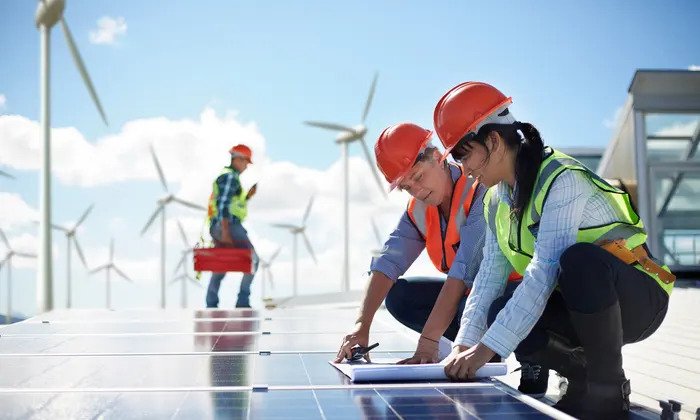
Energy harvesting, whether from mines or renewable sources, is a big issue worldwide, and a career as an energy engineer will put you at the forefront of this vital industry.
As an energy engineer, you will be involved in the production of energy from natural resources such as oil and gas extraction, as well as renewable or sustainable energy sources such as biofuels, hydro, wind, and solar power.
Responsibilities
Throughout your apprenticeship, you may help:
- research and design new generating sites
- decide on the best locations for sites
- plan and oversee production programmes for sites
- manage and coordinate teams of technicians or site workers
- design and select equipment
- meet environmental standards, like carbon reduction targets
- find the most cost efficient and productive processes
- carry out laboratory experiments
- convert experiments into large-scale industrial processes
- work with geologists, geophysicists and specialist contractors
- manage projects and budgets.
Salary
- Starting salaries for apprentice energy engineers range from £20,000 to £22,000.
- With experience, you could earn a salary in the range of £35,000 to £60,000.
- Salaries can be even higher at the most senior levels within large companies.
Working hours
If you work within design, research or development, you’ll typically work 9am to 5pm, Monday to Friday. In power plant or drilling operations, you may find you need to cover a seven-day shift pattern working 41 to 43 hours per week.
Working environment
You could work at a power station, in an office, in a laboratory or on a rig.
Qualifications
Qualifications you can achieve as an apprentice energy engineer include:
- Level 6 Nuclear Scientist and Nuclear Engineer – Entry requirements for this level include 4 or 5 GCSEs at grades 9 to 4 (A* to C) and A levels, or equivalent, for a degree apprenticeship. This qualification will take 36 months to complete.
- Level 4 Electrical Power Networks Engineer – Entry requirements for this level include 4 or 5 GCSEs at grades 9 to 4 (A* to C) and A levels, or equivalent, for a higher or degree apprenticeship. This qualification will take 30 months to complete.
- Level 7 Power and Propulsion Gas Turbine Engineer – Entry requirements for this level include 4 or 5 GCSEs at grades 9 to 4 (A* to C) and A levels, or equivalent, for a degree apprenticeship. This qualification will take 36 months to complete.
Skills
On an energy engineer apprenticeship, you’ll learn:
- knowledge of engineering science and technology
- maths knowledge
- analytical thinking skills
- to be thorough and pay attention to detail
- thinking and reasoning skills
- the ability to use your initiative
- the ability to come up with new ways of doing things
- knowledge of building and construction
- to be able to use a computer and the main software packages competently.
Employers
Energy engineers are in great demand as firms in all major sectors see the need to create specialised energy jobs in response to changing legislation, rising energy prices, and more public awareness. Including:
- industrial employers
- fuel production industries including oil, gas and nuclear
- manufacturing companies
- government departments.
Professional development
You might work toward becoming a chartered engineer (CEng). The Engineering Council grants this internationally recognised accreditation. With CEng certification, you may earn more money and advance your career.
The process of being chartered is sped up if you have an accepted undergraduate degree and a Masters or an acknowledged integrated MEng degree. For more information on which qualifications are approved, visit the Engineering Council Accredited Course Search (ACAD).
Companies may provide the opportunity to study for a part-time MSc in a relevant field to help with the chartered status application process. More information on becoming a chartered engineer may be found at Engineering Council – Chartered Engineer.
Continuing professional development (CPD) is essential in energy engineering to ensure you stay current on advances and technology. EI promotes ongoing education and offers an online tool to help you monitor your relevant activities. Two examples include reading commercial publications and attending networking events and conferences.
The EI and IET provide training courses, seminars, and conferences to help you broaden your knowledge and skills.
Career prospects
Because this sector is in great demand, career opportunities abound, and you will nearly always have the option to move to a senior engineer or management position. This may need transferring employment to a bigger organisation or moving.
Obtaining chartered status may help in professional development and lead to higher remuneration. Fellowship status is achievable with organisations such as EI. Typically, you must have worked in a job for more than seven years, with at least five years at a senior level.
You may work in corporate social responsibility (CSR) or research and development, exploring new and better ways to optimise production and find new renewable energy sources.
Working for one of the growing environmental consultants, being self-employed, or teaching energy engineering in schools are additional choices.
